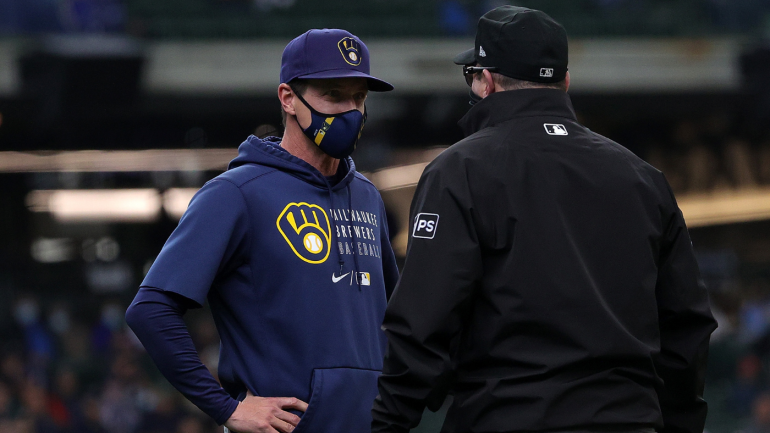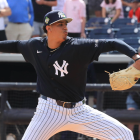MLB umpire Marty Foster stands by 'terrible' obstruction call in Brewers-Marlins game
'It's even worse looking at the replay,' Milwaukee manager Craig Counsell said

The Milwaukee Brewers hosted the Miami Marlins on Wednesday (MIA-MIL GameTracker), and it didn't take for controversy to descend upon the baseball festivities. Take a look at first base umpire Marty Foster making a call against the Brewers that may charitably be described as "baffling":
So Isan Diaz grounded a Zack Godley sinker to the right side, and Godley was able to make the play and toss to Daniel Vogelbach for the apparent second out of the inning. However, Foster apparently ruled that Godley obstructed Diaz's path to the bag even though it wasn't a close play. Godley was charged with an error on the play because the rules say that's how obstruction calls are to be scored.
Speaking of which, obstruction is the call when, in the umpire's judgment, a fielder impeded a baserunner while said fielder was neither in possession of the bar nor in the act of fielding the ball. In Fosters' judgement, Godley wasn't in the act of fielding the ball (the toss had already been made to first base), which means that Diaz had the "right of way." Presumably, Foster perceived that Godley affected Diaz's path the bag. If you squint, you can maybe say Diaz slowed up just a bit as Godley moved in front of him to make the toss, but it seems a reach to suggest he would've been safe at first if not impeded by Godley.
On the other side, many on social media have pointed out that Diaz was outside the runner's lane that comes into play over the final 45 feet of the journey to first base. That's not really in play here, however. Umps are going to make that call only when the ball is fielded in the vicinity of home plate and only when the runner's path interferes with the catch at first base. That's not what happened here.
For whatever reason, though, the obstruction call was made, and afterward Foster stood by it:
Umpire Marty Foster said he got obstruction call right: . "I’m 100% sure that the runner was impeded on his way to first base."
— Tom (@Haudricourt) April 28, 2021
More from Foster: "(Diaz) actually makes a jog to the right to get out of his way, to get out of Godley’s way. That’s clear-cut obstruction. It doesn’t have to be contact. It just has to be hinder or obstruct, and that’s what happened."
— Tom (@Haudricourt) April 28, 2021
Foster said it didn't matter that Diaz was running inside the base lane: "Wherever they’re at, at the time, is their basepath. The footlane has nothing to do with this play. . The three-foot lane does not apply here. It’s where the runner is; that’s his basepath."
— Tom (@Haudricourt) April 28, 2021
On that play, Corey Dickerson would've scored from third even if the put-out at first had been acknowledged, but a second run scored in the frame following what would've been a third out of the inning. In that sense, the call hurt the Brewers. Because the call was of the judgment variant, it wasn't reviewable.
Not surprisingly, Milwaukee manager Craig Counsell took exception to the call:
Craig Counsell: "It was a terrible call. I have no idea what Marty was trying to make up there, what he saw. It's even worse looking at the replay."pic.twitter.com/asScOsJxfc
— Adam McCalvy (@AdamMcCalvy) April 28, 2021
Given the ticky-tack nature of the call, Counsell's frustration is quite understandable.


















